Publications Search Results
Our Publication Search Results
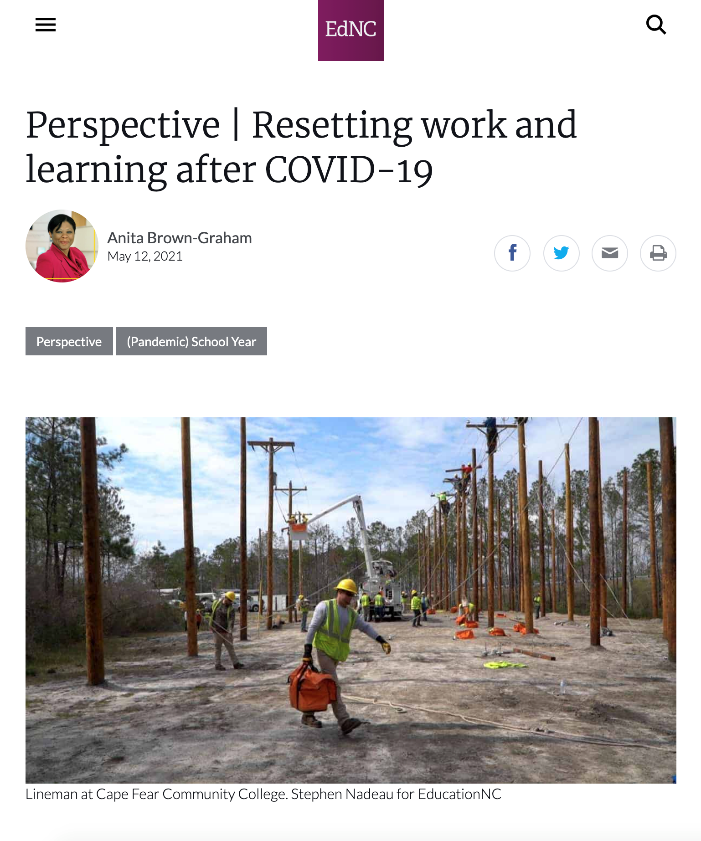
Perspective | Resetting work and learning after COVID-19
05/12/21“The predictions are of great concern for all students, but we know that some will be more disproportionately impacted by learning loss. Underserved students have been even more underserved during the pandemic. We need an acceleration plan.”
…
Continued
Community Development Organizations’ Capacity to Respond to COVID-19: The Strategic Use of Social Capital
05/01/21It has long been noted that community development organizations use social capital to build capacity for the constituencies they serve. Less recognized, however, is the ability of these organizations to leverage social capital to improve their own capacities. Our research shows that CDOs that use social capital in this way are more likely to be resilient. How do they do it? The leaders we spoke with identified strategies related to expanding their networks, clearly articulating/reciprocating benefits, and pinpointing opportunities to improve competencies.
…
Continued
Homegrown Tools Case Study: Belmont, NC
01/31/21“The “Keep the Lights on in Belmont” campaign was created and is still run by the Downtown Belmont Development Association. Originally, the strategy started to address concerns about Main Street businesses’ inability to continue operating. As it is the center of town, it was important to put focus on ensuring its health.”
…
Continued
Homegrown Tools Case Study: Fayetteville, NC
01/31/21“After businesses began to temporarily close and unemployment increased, it became clear that the pandemic would have an immediate impact on the local economy in Fayetteville. The City’s Economic and Community Development Department began to work with the Chamber of Commerce and the Center for Economic Empowerment and Development (CEED), a local nonprofit, to find a solution. This partnership network paved the way for providing bridge funding for businesses.”
…
Continued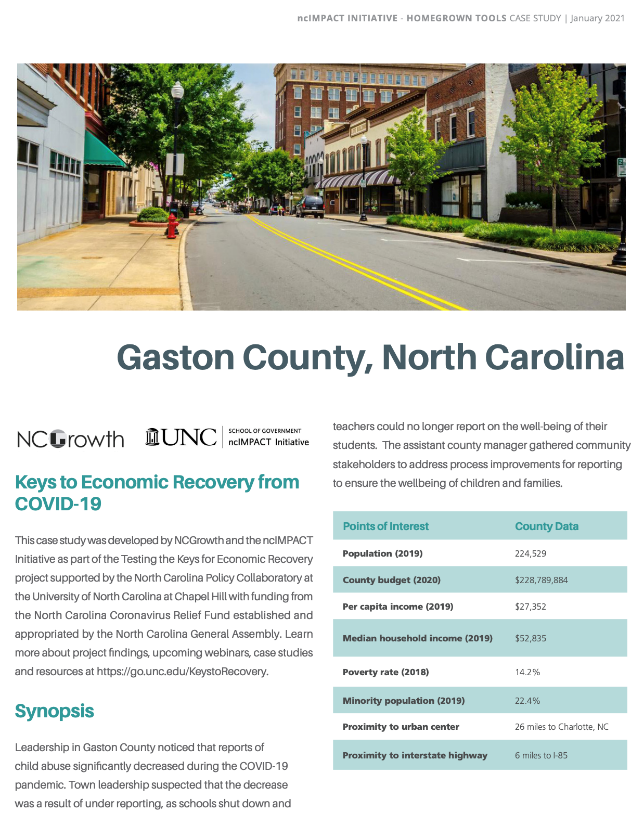
Homegrown Tools Case Study: Gaston County, NC
01/31/21“The BrightHive partnership was established before the pandemic, as Gaston County had already been working on process improvements for child welfare reporting. Given the unique impact of the pandemic on this issue, the County was able to use CARES Act funds to elevate the work and contract BrightHive to create a data trust. A data trust is a system that brings together data from many different sources, synthesizing it onto one platform. BrightHive is creating a data trust to identify new, and more resilient sources of data and data-sharing networks to provide the information human services staff need to keep children safe from abuse and/or neglect.”
…
Continued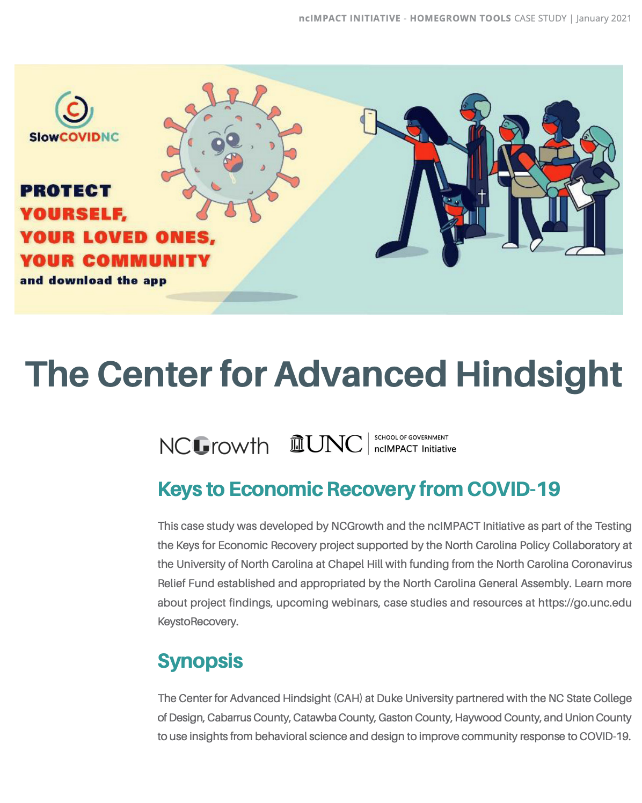
Homegrown Tools Case Study: The Center for Advanced Hindsight
01/31/21“The Center for Advanced Hindsight at Duke University seeks to use behavioral science to make people happier, healthier, and wealthier through research and human-centered design. With this project, CAH sought to provide behavioral science tools to county governments that would lead to long term behavior change, allowing for safe re-opening and realization of economic opportunities that have been delayed due to COVID-19. Recognizing that a majority of the federal relief funding was targeted to cities, CAH designed the project for counties to test solutions, promote collaboration, and learn from each other.”
…
Continued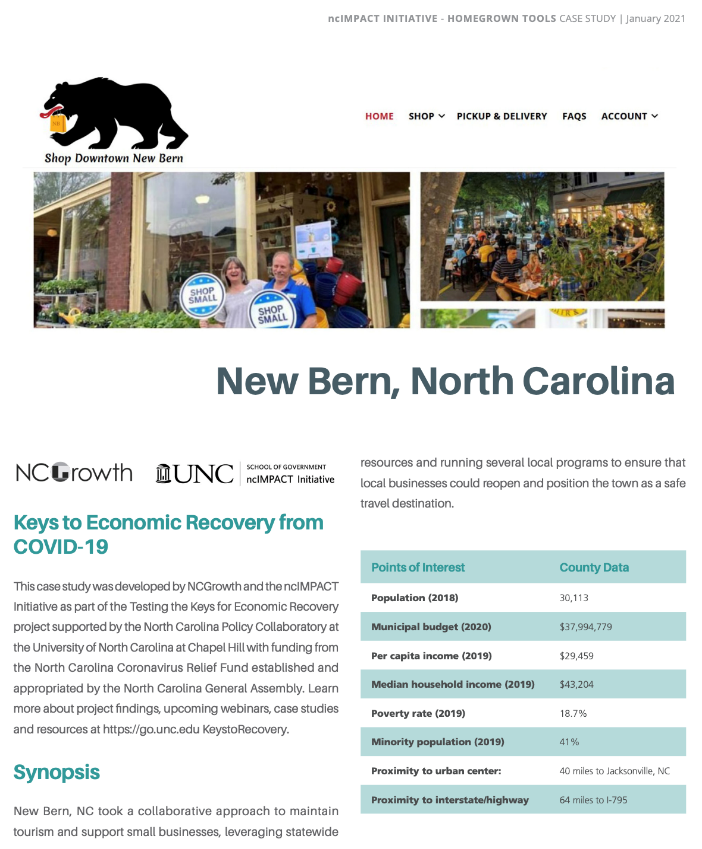
Homegrown Tools Case Study: New Bern, NC
01/31/21“Count on Me NC was promoted to all the destination marketing organizations across North Carolina. Visit New Bern, New Bern’s tourism development authority, was an early adopter and went further to partner with Visit NC through their cooperative marketing program to promote the town as a safe travel destination. Visit New Bern encouraged local restaurants, hotels, and other businesses to get the Count On Me NC certification so that they could position the town as a safe travel destination.”
…
Continued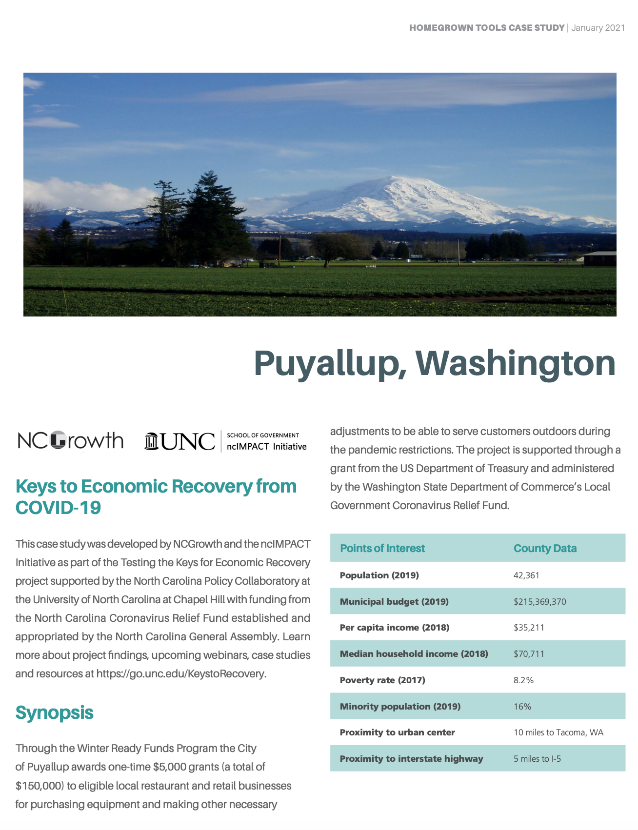
Homegrown Tools Case Study: Puyallup, WA
01/31/21“The City of Puyallup is a commuter city in the Puget Sound region of Washington. Puyallup’s economy relies heavily on the retail, restaurant, and visitor services industry of its commercial district, anchored by South Hill Mall, and its historic downtown. The unique nature of the COVID-19 pandemic and the indoor capacity restrictions negatively impacted local businesses. To allow for retail and restaurant businesses to operate according to public health guidelines, the City created a grant to support businesses’ efforts to prepare for the colder winter temperatures and continue to provide services outdoors.”
…
Continued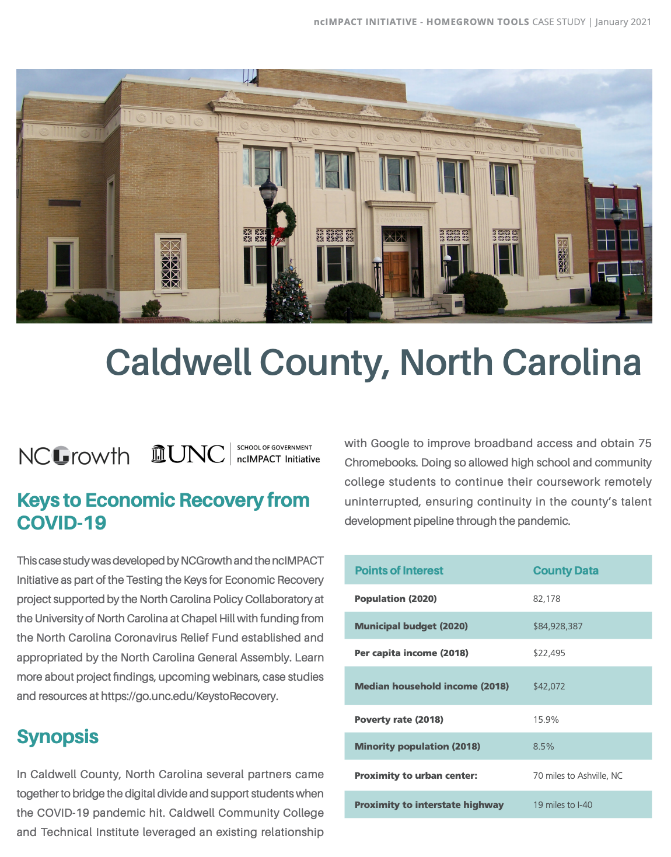
Homegrown Tools Case Study: Caldwell County, NC
01/31/21“CCC&TI first consulted with the county health department and other healtcare entities to understand the scope of the problem. CCC&TI also surveyed students and conducted outreach through social media to understand their needs. They found 111 students in curriculum courses without internet access, 78 without devices, and 40 lacked both. Based on this information, leadership reached out to Google to explore techincal solutions. The college has a longstanding relationship with Google and their history of collaboration and trust made it easy to work together to address this emergency need.”
…
Continued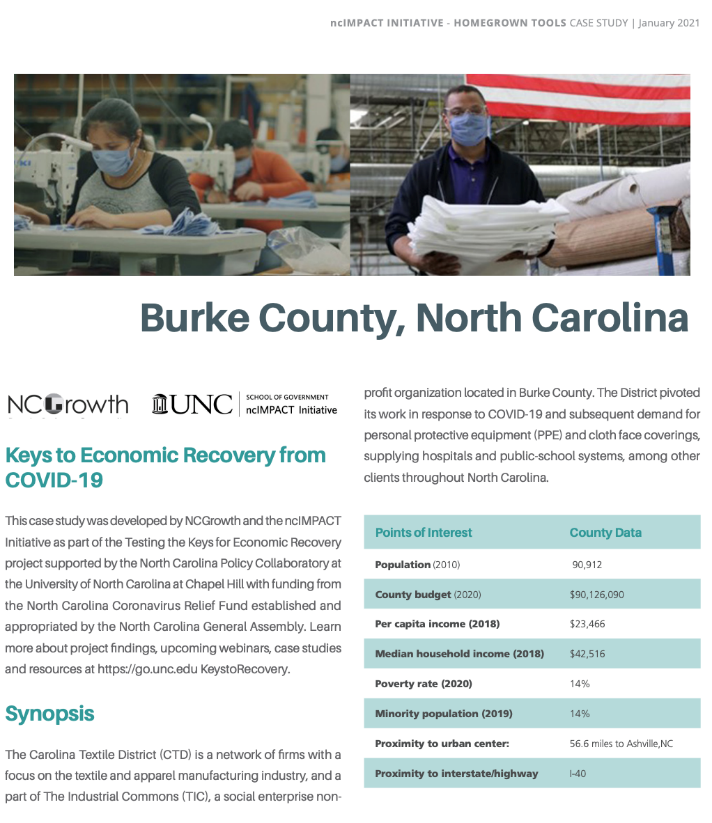
Homegrown Tools Case Study: Burke County, NC
01/31/21“During the COVID-19 pandemic when demand for regular products slowed down, this network and support structure enabled CTD to quickly meet the increased need for personal protective equipment (PPE) and cloth face coverings. Their overall structure did not change, but rather shifted to meeting specific needs by adding new partners and contracting with new clients.”
…
Continued
NC Local Government Responses to the Coronavirus Pandemic
10/01/20This report offers insights from the results of two surveys of North Carolina’s elected and appointed local government leaders in response to COVID-19. While the spring survey came at a time when unemployment claims surged ahead of positive COVID-19 cases, by the fall, despite positive cases soaring to new records, the economy appeared to have settled significantly due to news about near-term vaccines. Our analysis points out notable contextual changes between the spring and fall. However, much remained the same in the world of North Carolina local governments.
…
Continued
NC Local Government Early Responses to and Insights into the Coronavirus Pandemic
08/01/20“Overwhelmingly and not surprisingly, given the unprecedented nature of the pandemic, three-fourths of respondents indicated they expected a negative impact on the local government due to COVID-19. Nearly all other respondents indicated that it was simply too soon to tell, with almost no respondents indicating no impact or a positive impact.
Just over ten percent of respondents chose to further explain their concerns. These respondents highlighted cancellations of in-person meetings, including public meetings; loss of funds, both for the government itself and the community; and, the adverse impacts for citizens, including food insecurity and unemployment as high concerns about negative impacts of the pandemic.”
…
Continued
Emerging Social Capital Principles and Practices
06/17/20According to our expert advisors, before individual practices are put in place, certain principles – referred to by those involved as ideas, convictions, or values — need to exist in programs first. They should be recognized and used by staff. All aspects of a social capital-based approach rely on these principles.
…
Continued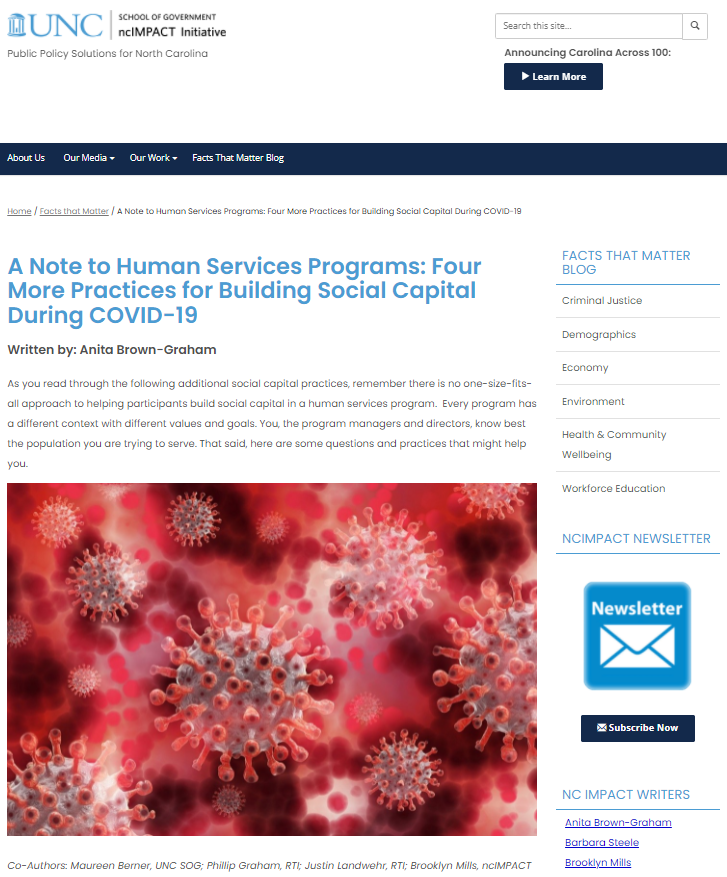
A Note to Human Services Programs: Four More Practices for Building Social Capital During COVID-19
04/01/20As you read through the following additional social capital practices, remember there is no one-size-fits-all approach to helping participants build social capital in a human services program. Every program has a different context with different values and goals. You, the program managers and directors, know best the population you are trying to serve. That said, here are some questions and practices that might help you.
…
Continued